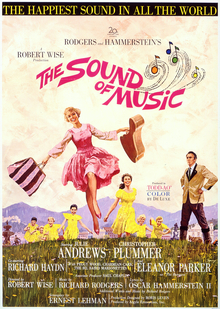Film: The Sound Of Music
Director: Robert Wise
Country: USA
Released: March 1965
Runtime: 174 minutes
Genre: Musical
Studio: 20th Century Fox
Influenced: Rob Reiner, Jennifer Lee, Rob Marshall, Olivia Wilde, Greta Gerwig
A golden age for musicals on film was undoubtedly the mid-to-late 60s with releases such as My Fair Lady (1964), A Hard Day's Night (1964), The Umbrellas of Cherbourg (1964), Mary Poppins (1964, my personal favourite), Funny Girl (1968), Chitty Chitty Bang Bang (1968) and of course The Sound of Music (1965). Based on the 1959 Rodgers & Hammerstein stage musical of the same name, in turn based on the 1949 memoir of Maria von Trapp, The Sound of Music is arguably the most famous screen musical of all time, with the possible exception of Singin' In The Rain (1952) or West Side Story (1961). Yes, it's a bit corny but it would be churlish not to include it here given its widespread and lasting influence.
Produced by Robert Wise and directed by Wise and Ernest Lehman, the film helped to revive the fortunes of 20th Century Fox, which had nearly gone broke making Cleopatra (1963). For several years, it was the highest-grossing film of all time, outdoing even Gone With The Wind (1939), a similarly epic story. One of director Robert Wise's best decisions was to film The Sound Of Music on location rather than on set, making Salzburg the major star. It was one of the first films to use a 70mm film format, which allowed for stunning visuals that captured Austria's breathtaking mountains, lakes and castles. Wise used long shots to show Salzburg's grandeur, as well as close-ups to capture the details of its architecture, and it was all filmed in vivid, vibrant colour to reflect the movie's upbeat atmosphere.
Perhaps the major factor in the film's runaway success was the score, originally composed by Rodgers & Hammerstein and featuring memorable hits such as Do-Re-Mi, My Favourite Things, The Sound of Music, Edelweiss, Climb Ev'ry Mountain, The Lonely Goatherd and So Long, Farewell. The film won five Academy Awards, including Best Original Score. Rodgers & Hammerstein were drawn to the story of Maria von Trapp's journey from a novice nun to a wife and mother, and they were also impressed by the family's real-life singing talents. In the film, the children are unruly and difficult, but Maria quickly wins them over with her love of music and her kind heart. Starring Julie Andrews as Maria, a postulant at Nonnberg Abbey in Salzburg who is sent to the home of Captain Georg von Trapp (Christopher Plummer) to serve as governess to his seven children, the movie depicts how Maria brings music and joy into the children's lives, and eventually falls in love with the Captain.
Maria and the Captain marry but the von Trapp family is forced to flee Austria when the Nazis annex the country, eventually making their way to America. One of the most powerful legacies of the film is the way it has revived the tradition of the singalong. In the early days of cinema, people would often sing along to the songs because the films were all silent, and so the songs were an important way for people to summon up a sense of musicality. As films became more popular, and as sound technology improved, the trend of singalongs began to decline. However, starting in the late 90s – in the case of The Sound of Music at a gay & lesbian film festival in London – this trend was revived and ever since, various singalong screenings of the film and a singalong DVD have been released to help recapture that communal feeling.

Comments